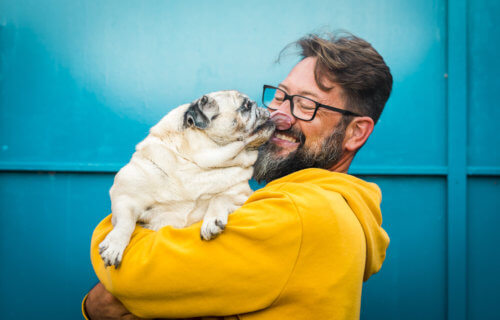LISBON, Portugal — Are you a pet owner that doesn’t mind letting your furry friend lick your face? A new study finds you may want to think twice about it from now on. An international team found that dogs and cats may be passing antibiotic-resistant bacteria to their owners.
The team from Portugal and the United Kingdom adds that pets may also be passing along genes which play crucial roles in bacterial resistance to their human friends as well.
“Our findings verify not only the sharing of antibiotic resistant bacteria but also of resistance genes between companion animals and their owners in the community, underscoring the need for continuous local surveillance programs to identify the potential risk to human health,” says Dr. Juliana Menezes from the University of Lisbon in a media release.
What’s lurking in a pet’s gut?
Scientists continue to express concern about the role animals play as “potential reservoirs of antimicrobial-resistant bacteria.” The researchers point out that E. coli bacteria is common in the intestines of both humans and their pets. Although many strains are harmless, some can cause food poisoning and potentially fatal infections.
Previous studies have warned about the growing threat of infections which are now highly resistant to antibiotic medication. These include strains with ESBL and AmpC-producing Enterobacteriaceae (AmpC-E) and Carbapenemase-producing Enterobacterales (CPE) — all which are resistant to penicillin and cephalosporins.
In the new study, researchers wanted to find out if there’s any evidence that harmful bacteria strains are moving from one species to another — specifically, from our cats and dogs to people.
Pets and pet owners are sharing the same germs
Study authors evaluated the bacterial makeup of both pets and their owners visiting veterinary hospitals in Portugal and the U.K. between 2018 and 2020. The team notes that the study only examined people and pets with no bacterial infections or history of taking antibiotics over the prior three months.
They collected stool samples from 58 healthy people, 40 dogs, and 18 cats in Portugal to examine the bacteria in their systems. Researchers also collected samples from another 56 people and 45 dogs living in 42 households across the U.K. over a period of four months.
Overall, researchers found 15 of the 103 pets and 15 of the 114 pet owners were carrying ESBL/AmpC-producing bacteria. Out of this group, six of the 15 cats and dogs and four people had at least one multidrug-resistant strain of bacteria in their gut.
In four Portuguese households, the team also found the same ESBL/pAMPc resistance genes from pets in their owners as well. In one of these homes, researchers found multiple instances of bacteria strains being shared between pets and humans over the four-month period. Moreover, the team discovered matching E. coli strains between pets and their owners’ stool samples in two households.
“Sometimes the bacteria may not be shared, but their resistance genes can be,” explains Dr. Menezes. “These genes are found in mobile bits of DNA, meaning that they can be transferred between different bacterial populations in animal and humans.”
‘The biggest threats to public health’
“Even before the COVID-19 pandemic, antibiotic resistance was one of the biggest threats to public health because it can make conditions like pneumonia, sepsis, urinary tract and wound infections untreatable. Although the level of sharing from the households we have studied is low, healthy carriers can shed bacteria into their environment for months, and they can be a source of infection for other more vulnerable people and animals such as the elderly and pregnant women. Our findings reinforce the need for people to practice good hygiene around their pets and to reduce the use of unnecessary antibiotics in companion animals and people,” Dr. Menezes continues.
The team notes their study is only observational and cannot definitively prove that harmful bacteria is passing between pets and pet parents. Aside from pets, previous studies show antibiotic-resistant bacteria is also a major concern in hospitals, gyms, and even washing machines.
The researchers are presenting their findings at the 2022 European Congress of Clinical Microbiology & Infectious Diseases (ECCMID).

